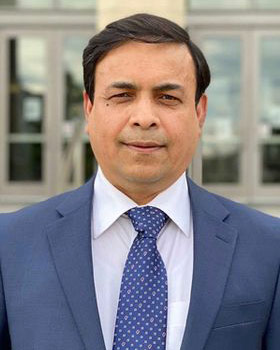Utilization of Biologicals and Biofumigation for Effective Management of Soilborne Diseases in Fruits and Vegetables
Recorded October 5, 2022
Download presentation slides (PDF, 12 MB)
Description

Dr. Mahfuz Rahman, plant pathologist and Extension specialist at West Virginia University.
To overcome the challenge of increasing food production with a significant reduction of agrochemicals use and environmental pollution (especially from synthetic chemicals), a great deal of interest and research have been devoted to beneficial microbes (BM) in recent days. Years of experiments in controlled environments suggest that the potential upside in production will be real, i.e., crops inoculated with BM biostimulants will outperform non-inoculated ones. There are numerous examples of positive effects on plant growth and fruit quality enhancement as well as disease resistance by BM. Growth enhancement in horticultural crops such as tomatoes and strawberries has been achieved by applying these BM early in the seedling production stage. The enhanced growth and root system colonization by BM also provided protection from soil-borne disease organisms. However, application method and timing can determine the outcome from such treatments. Application methods and results from some recent studies on tomatoes, eggplants, okras, and strawberries will be presented.
Dr. Mahfuz Rahman
Dr. Mahfuz Rahman conducts applied research and provides leadership for statewide educational/informational programs in plant pathology that include disease identification and management recommendations. Early diagnosis of pest problems remains at the cornerstone of his adaptive and applied research program at WVU that seeks to address disease problems primarily in vegetables and fruits. He takes an integrated approach that includes cutting-edge research on pathogen detection and quantification, proactive measures to avoid the introduction of harmful pathogens with planting material, and adoption of measures based on the disease forecast model. He received his M.S. and Ph.D. in plant pathology from Oregon State University, and Simon Fraser University, Canada, respectively.
